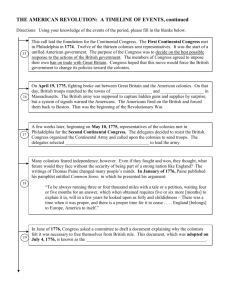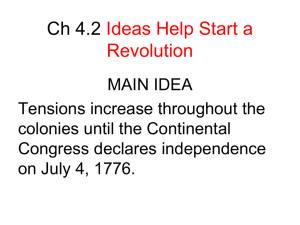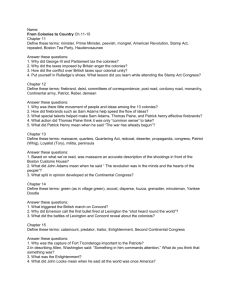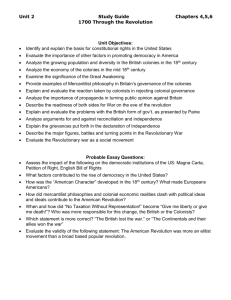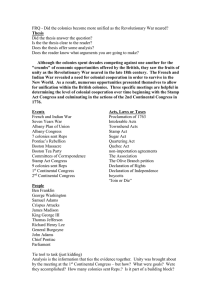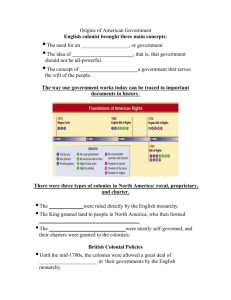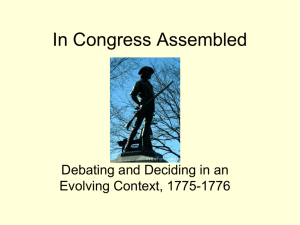Reading for 1st and 2nd Continental Congress
advertisement
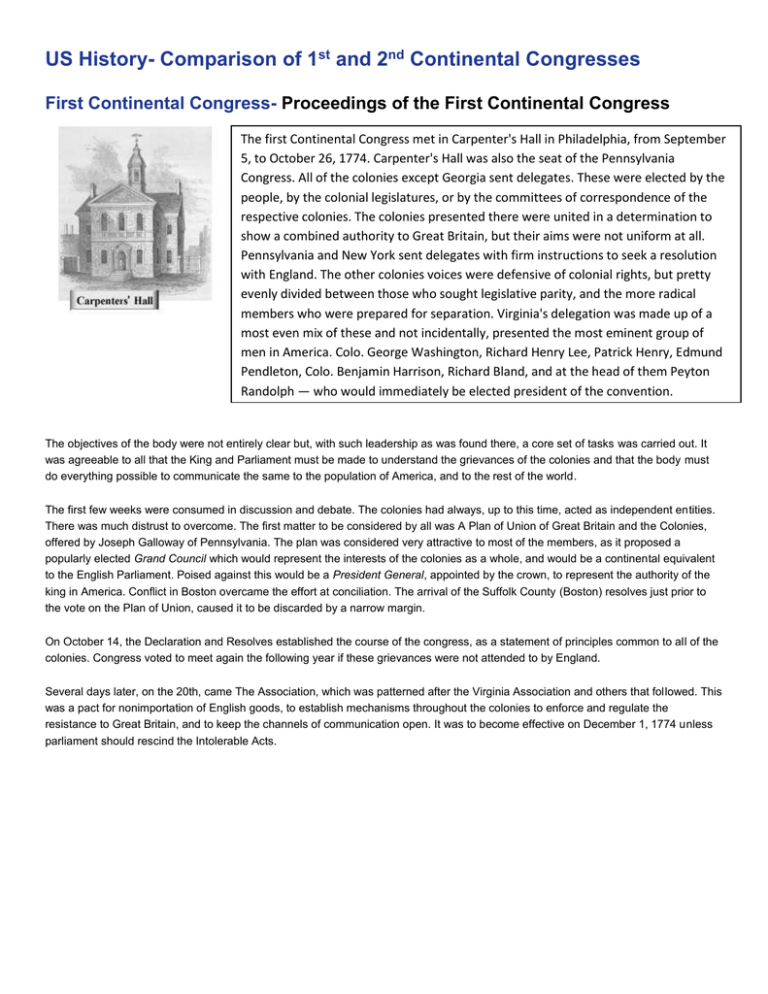
US History- Comparison of 1st and 2nd Continental Congresses First Continental Congress- Proceedings of the First Continental Congress The first Continental Congress met in Carpenter's Hall in Philadelphia, from September 5, to October 26, 1774. Carpenter's Hall was also the seat of the Pennsylvania Congress. All of the colonies except Georgia sent delegates. These were elected by the people, by the colonial legislatures, or by the committees of correspondence of the respective colonies. The colonies presented there were united in a determination to show a combined authority to Great Britain, but their aims were not uniform at all. Pennsylvania and New York sent delegates with firm instructions to seek a resolution with England. The other colonies voices were defensive of colonial rights, but pretty evenly divided between those who sought legislative parity, and the more radical members who were prepared for separation. Virginia's delegation was made up of a most even mix of these and not incidentally, presented the most eminent group of men in America. Colo. George Washington, Richard Henry Lee, Patrick Henry, Edmund Pendleton, Colo. Benjamin Harrison, Richard Bland, and at the head of them Peyton Randolph — who would immediately be elected president of the convention. The objectives of the body were not entirely clear but, with such leadership as was found there, a core set of tasks was carried out. It was agreeable to all that the King and Parliament must be made to understand the grievances of the colonies and that the body must do everything possible to communicate the same to the population of America, and to the rest of the world. The first few weeks were consumed in discussion and debate. The colonies had always, up to this time, acted as independent entities. There was much distrust to overcome. The first matter to be considered by all was A Plan of Union of Great Britain and the Colonies, offered by Joseph Galloway of Pennsylvania. The plan was considered very attractive to most of the members, as it proposed a popularly elected Grand Council which would represent the interests of the colonies as a whole, and would be a continental equivalent to the English Parliament. Poised against this would be a President General, appointed by the crown, to represent the authority of the king in America. Conflict in Boston overcame the effort at conciliation. The arrival of the Suffolk County (Boston) resolves just prior to the vote on the Plan of Union, caused it to be discarded by a narrow margin. On October 14, the Declaration and Resolves established the course of the congress, as a statement of principles common to all of the colonies. Congress voted to meet again the following year if these grievances were not attended to by England. Several days later, on the 20th, came The Association, which was patterned after the Virginia Association and others that followed. This was a pact for nonimportation of English goods, to establish mechanisms throughout the colonies to enforce and regulate the resistance to Great Britain, and to keep the channels of communication open. It was to become effective on December 1, 1774 unless parliament should rescind the Intolerable Acts. By the end of 1774 Delegates New Hampshire: John Sullivan, Nathaniel Folsom Massachusetts Bay: John Adams, Samuel Adams, Thomas Cushing, Robert Treat Paine Rhode Island: Stephen Hopkins, Samuel Ward Connecticut: Eliphalet Dyer, Roger Sherman, Silas Deane New York: Isaac Low, John Alsop, John Jay, Philip Livingston, James Duane, William Floyd, Henry Wisner, Simon Boerum New Jersey: James Kinsey, William Livingston, Stephen Crane, Richard Smith, John De Hart Pennsylvania: Joseph Galloway, John Dickinson, Charles Humphreys, Thomas Miffin, Edward Biddle, John Morton, George Ross Delaware: Caesar Rodney, Thomas McKean, George Read Maryland: Matthew Tilghman, Thomas Johnson, William Paca, Samuel Chase, Robert Goldsborough Virginia: Peyton Randolph, Richard Henry Lee, George Washington, Patrick Henry, Richard Bland, Benjamin Harrison, Edmund Pendleton North Carolina: William Hooper, Joseph Hewes, Richard Caswell South Carolina: Henry Middleton, Thomas Lynch, Jr., Christopher Gadsden, John Rutledge, Edward Rutledge Second Continental Congress Times had taken a sharp turn for the worse. Lexington and Concord had changed everything. When the Redcoats fired into the Boston crowd in 1775, the benefit of the doubt was granted. Now the professional imperial army was attempting to arrest patriot leaders, and minutemen had been killed in their defense. In May 1775, with Redcoats once again storming Boston, the Second Continental Congress convened in Philadelphia. The questions were different this time. First and foremost, how would the colonist meet the military threat of the British. It was agreed that a CONTINENTAL ARMY would be created. The Congress commissioned George Washington of Virginia to be the supreme commander, who chose to serve without pay. How would supplies be paid for? The Congress authorized the printing of money. Before the leaves had turned, Congress had even appointed a standing committee to conduct relations with foreign governments, should the need ever arise to ask for help. No longer was the Congress dealing with mere grievances. It was a full-fledged governing body. Manuscript Division, Library of Congress This rough draft of the Declaration of Independence was handwritten by Thomas Jefferson. It is believed that it was copied from several "creative drafts." The changes made from draft to final form help us understand more precisely the meanings the declaration committee intended. National Park Service Still, in May of 1775 the majority of delegates were not seeking independence from Britain. Only radicals like John Adams were of this mindset. In fact, that July Congress approved the OLIVE BRANCH PETITION, a direct appeal to the king. The American delegates pleaded with George III to attempt peaceful resolution and declared their loyalty to the Crown. The King refused to receive this petition and instead declared the colonies to be in a state of rebellion in August. Insult turned to injury when George ordered the hiring of HESSIAN mercenaries to bring the colonists under control. Americans now felt less and less like their English brethren. How could their fellow citizens order a band of ruthless, foreign goons? The moderate voice in the Continental Congress was dealt a serious blow. Independence Hall As the seasons changed and hostilities continued, cries for independence grew stronger. The men in Philadelphia were now wanted for treason. They continued to govern and hope against hope that all would end well. For them, the summer of 1776 brought the point of no return — a formal declaration of independence.
